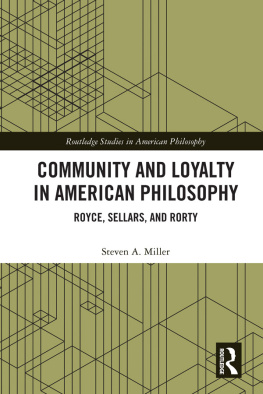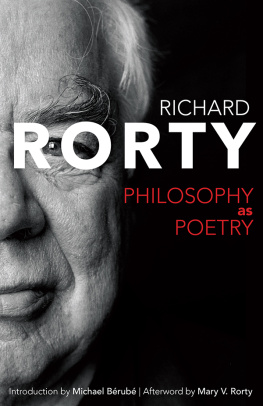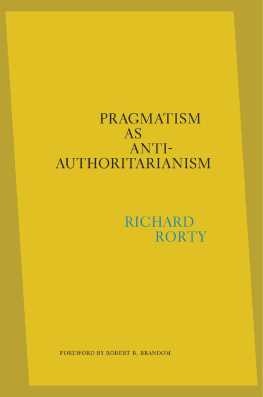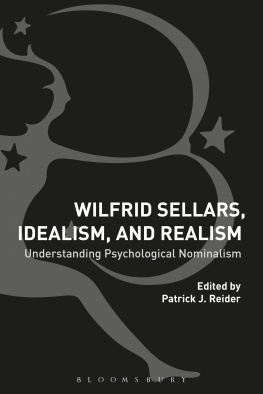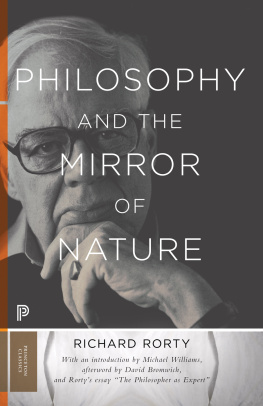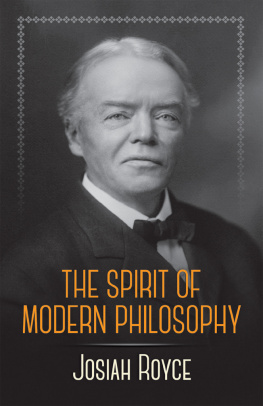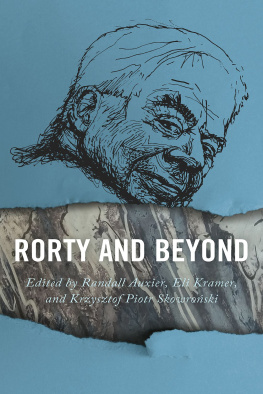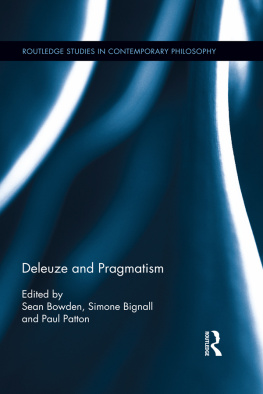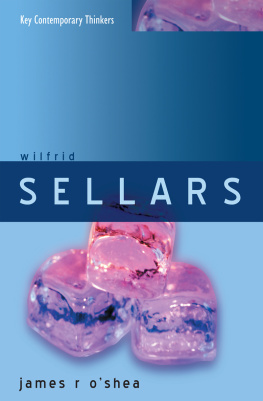Community and Loyalty in American Philosophy
Wea word both inclusive and exclusiveis the very basis of the notion of community. It is a word that means that one never has to go it solely alone. But its also a warning to outsiders: you dont belong with us. Miller leads us carefully along the boundaries of the word and allows us to see both the promise and peril of community. Millers account of Royce, Sellars and Rorty is engaging and scrupulous, a succinct and convincing appeal to reconsider the we in American intellectual history.
John Kaag, University of Massachusetts Lowell, USA
Steven Millers excellent book methodically reconstructs and explores, with depth and clarity and feeling, one of the most important philosophical ideas in the American philosophical tradition, from its early formulation in Josiah Royce and C. S. Peirce, to its mid-twentieth-century analytic articulation in Wilfrid Sellars, to its contemporary pragmatist vision in the wide-ranging writings of Richard Rorty: namely, that we understand ourselves best when we understand ourselves as loyal members of a unified community of we-saying fellow sufferers joined together in our many projects for the betterment of humanity.
Jerold Abrams, Creighton University
American pragmatism has always had at its heart a focus on questions of communities and ethics. This book explores the interrelated work of three thinkers influenced by the pragmatist tradition: Josiah Royce, Wilfrid Sellars, and Richard Rorty. These thinkers work spanned the range of twentieth-century philosophy, both historically and conceptually, but all had common concerns about how morality functions and what we can hope for in our interactions with others. Steven A. Miller argues that Royce, Sellars, and Rorty form a traditional line of inheritance, with the thought of each developing upon the best insights of the ones prior. Furthermore, he shows how three divergent views about the function, possibilities, and limits of moral community coalesce into a key narrative about how we can best work with and for other people, as we strive to come to think of widely different others as somehow being morally considerable as one of us.
Steven A. Miller is a fellow with the Institute for American Thought at Indiana University-Purdue University Indianapolis as well as an adjunct scholar at Ripon College in Ripon, WI. His work has previously appeared in the Transactions of the Charles S. Peirce Society, Administration and Society, and the Journal of Social Philosophy.
Routledge Studies in American Philosophy
Edited by Willem deVries,
University of New Hampshire, USA and
Henry Jackman,
York University, Canada
Sellars and Contemporary Philosophy
Edited by David Pereplyotchik and Deborah R. Barnbaum
Pragmatism and Objectivity
Essays Sparked by the Work of Nicolas Rescher
Edited by Sami Pihlstrm
The Quantum of Explanation
Whiteheads Radical Empiricism
Randall E. Auxier and Gary L. Herstein
Peirce on Perception and Reasoning
From Icons to Logic
Edited by Kathleen A. Hull and Richard Kenneth Atkins
Pierces Speculative Grammar
Logic as Semiotics
Francesco Bellucci
Pragmatism, Pluralism, and the Nature of Philosophy
Scott F. Aikin and Robert B. Talisse
Pragmatism and the European Traditions
Encounters with Analytic Philosophy and Phenomenology Before the Great Divide
Edited by Maria Baghramian and Sarin Marchetti
Community and Loyalty in American Philosophy
Royce, Sellars, and Rorty
Steven A. Miller
For a full list of titles in this series, please visit www.routledge.com
Community and Loyalty in American Philosophy
Royce, Sellars, and Rorty
Steven A. Miller

First published 2018
by Routledge
711 Third Avenue, New York, NY 10017
and by Routledge
2 Park Square, Milton Park, Abingdon, Oxon OX14 4RN
Routledge is an imprint of the Taylor & Francis Group, an informa business
2018 Taylor & Francis
The right of Steven A. Miller to be identified as author of this work has been asserted by him in accordance with sections 77 and 78 of the Copyright, Designs and Patents Act 1988.
All rights reserved. No part of this book may be reprinted or reproduced or utilised in any form or by any electronic, mechanical, or other means, now known or hereafter invented, including photocopying and recording, or in any information storage or retrieval system, without permission in writing from the publishers.
Trademark notice: Product or corporate names may be trademarks or registered trademarks, and are used only for identification and explanation without intent to infringe.
Library of Congress Cataloging-in-Publication Data
A catalog record for this book has been requested
ISBN: 978-1-138-57023-8 (hbk)
ISBN: 978-0-203-70372-4 (ebk)
Typeset in Sabon
by Apex CoVantage, LLC
Contents
CIS | Richard Rorty, Contingency, Irony, and Solidarity |
EPM | Wilfrid Sellars, Empiricism and the Philosophy of Mind |
JLL | Richard Rorty, Justice as a Larger Loyalty |
PSIM | Wilfrid Sellars, Philosophy and the Scientific Image of Man |
PMN | Richard Rorty, Philosophy and the Mirror of Nature |
SM | Wilfrid Sellars, Science and Metaphysics |
One man, one family driven from the land; this rusty car creaking along the highway to the west. I lost my land, a single tractor took my land. I am alone and I am bewildered. And in the night one family camps in a ditch and another family pulls in and the tents come out. The two men squat on their hams and the women and children listen. Here is the node, you who hate change and fear revolution. Keep these two squatting men apart; make them hate, fear, suspect each other. Here is the anlage of the thing you fear. This is the zygote. For here I lost my land is changed; a cell is split and from its splitting grows the thing you hateWe lost our land. The danger is here, for two men are not as lonely and perplexed as one. And from this first we there grows a still more dangerous thing: I have a little food plus I have none. If from this problem the sum is We have a little food, the thing is on its way, the movement has direction. Only a little multiplication now, and this land, this tractor are ours. The two men squatting in the ditch, the little fire, the side-meat stewing in a single pot, the silent, stone-eyed women; behind, the children listening with their souls to words their minds do not understand. The night draws down. The baby has a cold. Here, take this blanket. Its wool. It was my mothers blankettake it for the baby. This is the thing to bomb. This is the beginningfrom I to we.
John Steinbeck, The Grapes of Wrath
The movement from I to we, from a narrow, individualistic conception of oneself to seeing oneself instead as tied up with and constituted by the lives and situations of other people, has been routinely disparaged in some quarters throughout the last half of the twentieth century and even into the earliest years of the twenty-first. Steinbeck, however, seems right: whatever kind of moral and social progress is possible requires individuals to identify and recognize themselves not as a lone individual, egotistically concerned with only his or her private affairs, but instead as part of a community, part of a we. This is not a new idea from either a philosophical or practical perspective. Two examples are obvious.

